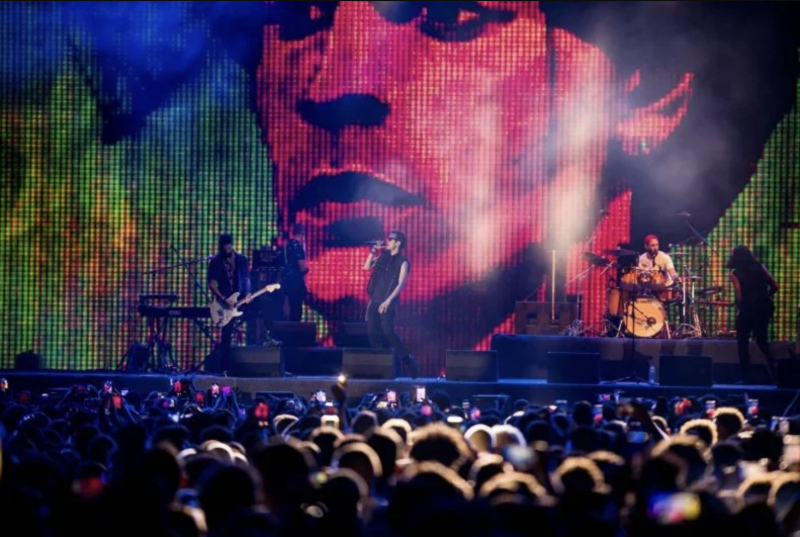
Lively visuals for Cairokee's concert in Cairo on Friday, May 17. (Credit: Hesham Marcelo/Instagram: @heshammarcelo12)
The excitement was palpable on the pathway connecting the stage to the various public entrances. Dozens of spectators came six to 10 hours in advance to ensure they found the best seats. Hundreds of young people were behind the barriers near the front of the stage.
When the singers arrived, the energy of the crowd was phenomenal. When the two lead singers rested against each other, two generations of listeners seemed to unite through this gesture, as evidenced by an audience of all ages, children on the shoulders of parents, students and their elders.
Cairokee is a giant of the Egyptian music industry in all styles. The rock band debuted in the 2000s and was met with immense success during the Egyptian Revolution in 2011.
Its music embodied hymns to freedom, constantly heard in the streets of Cairo and circulating on social media, including Ya al-midan or Sout al-Horeya. On this occasion, Cairokee allowed rock to assert itself as a musical genre in Egypt. The band has become a true icon of Egyptian culture, its concerns and exaltations.
Marwan Pablo, pioneer of Egyptian rap
The first act of this concert featured Marwan Pablo, a 26-year-old artist considered to be the pioneer of trap music (a genre of rap with the kick as its central element) in Egypt. He took his stage name from Pablo Escobar and Pablo Picasso, who represent power and the avant-garde in the imagination of Egyptian youth.
Marwan Pablo hails from Alexandria, a coastal city where many artists were born, hence its nickname al-wallada (Egyptian Arabic for the one who births children).
He became famous in 2019 thanks to a collaboration with the famous Egyptian producer Molotof. He has since continued to expand his audience. In a country divided between its national musical culture and a US cultural influence, he knew how to mix the style of his American idols Lil Wayne, 50 Cent and Eminem with the Egyptian genre known as Shaabi. This genre of music originated from young Egyptians of disadvantaged backgrounds recounting their daily life to rhythmic percussions.
Last week, the rapper officially became Diesel’s brand ambassador for the Middle East. Diesel designed his faded military-print show outfit and the artist feels he shares the brand’s bold spirit. His attention to his fashion identity testifies to his ambition to become the flagship of hip-hop music in the region.
Fifteen years separate Cairokee’s lead singer and Marwan Pablo; they belong to two distinct musical universes and generations. However, the reasons behind their collaboration go back to the project that brought them together in the past few years.
The artists worked together on Cairokee’s "Roma" album, released on Sept. 23, 2022. The album amazed the regional audience. The rock band, criticized by many of its fans for its less and fewer claimant lyrics in recent years, gave new vitality to its style by working with the young rapper.
This unexpected collaboration produced a real shock wave. From the first sentence of the "Tarantino" single, the rock band sang of its desire to write history as it wishes, to which Marwan Pablo responded with his ambition to leave his mark on it.
These artists have the same desire to produce music that is strong, emancipatory and evocative of the daily life of Egyptians, including the dreams of the youth or romantic memories.
At the concert, Marwan Pablo reappeared during the second act after the singer Amir Eid on "Tarantino." Their collaboration was a message through music: To witness a torch being passed, continuing the fight for freedom of expression in a context where the musical scene is confined to a set of a smaller range of topics.
This article was originally published in L'Orient-Le Jour. Translated by Joelle El Khoury. Edited by Yara Malka.